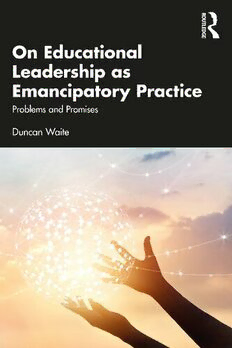
On Educational Leadership as Emancipatory Practice: Problems and Promises PDF
Preview On Educational Leadership as Emancipatory Practice: Problems and Promises
ON EDUCATIONAL LEADERSHIP AS EMANCIPATORY PRACTICE As a critical reflection on education and educational leadership today, this book makes use of the ideas of some of the major thinkers of our time—Adorno, Arendt, Biesta, Brown, Apple, Hall, Marx, Nietzsche, Rancière, Said, Williams, and others—in an examination of the emancipatory potential of education. AuthorDuncanWaiteexploresthepolitical,social,systemic,epistemological,and cultural barriers and roadblocks that inhibit liberatory education, discussing the concepts of corruption and abuse of power; systems and structures that hobble us; ideologies such as neoliberalism, capitalism, and corporatism; identity and con- sciousness; and conceptions of learning, growth, and development. Ultimately the authorunpackshowtheseissuesrelatetoliberation,emancipation,andsocialjustice forstudents,teachers,andeducationalleaders,aswellastheroleleadershipcanplay inrealizingtheemancipatorypromiseofeducation. Duncan Waite is Professor of Education and Community Leadership at Texas State University, USA, and Editor of the International Journal of Leadership in Education. ON EDUCATIONAL LEADERSHIP AS EMANCIPATORY PRACTICE Problems and Promises Duncan Waite Coverimage: ©GettyImages Firstpublished2022 byRoutledge 605ThirdAvenue,NewYork,NY10158 andbyRoutledge 4ParkSquare,MiltonPark,Abingdon,OxonOX144RN RoutledgeisanimprintoftheTaylor&FrancisGroup,aninformabusiness ©2022DuncanWaite TherightofDuncanWaitetobeidentifiedasauthorofthisworkhasbeen assertedinaccordancewithsections77and78oftheCopyright,Designsand PatentsAct1988. Allrightsreserved.Nopartofthisbookmaybereprintedorreproducedor utilisedinanyformorbyanyelectronic,mechanical,orothermeans,now knownorhereafterinvented,includingphotocopyingandrecording,orinany informationstorageorretrievalsystem,withoutpermissioninwritingfromthe publishers. Trademarknotice:Productorcorporatenamesmaybetrademarksorregistered trademarks,andareusedonlyforidentificationandexplanationwithoutintent toinfringe. LibraryofCongressCataloging-in-PublicationData Acatalogrecordforthistitlehasbeenrequested ISBN:978-0-367-75891-2(hbk) ISBN:978-0-367-75890-5(pbk) ISBN:978-1-003-16444-9(ebk) DOI:10.4324/9781003164449 TypesetinBembo byTaylor&FrancisBooks CONTENTS Preface vi Acknowledgments ix 1 By Way of an Introduction 1 2 Contextual Considerations Considered Differently 13 3 On the Shortcomings of Our Organizational Forms 50 4 The Imperium: Class, Caste, and Control 71 5 Imperial Hubris: The Dark Heart of Leadership 91 6 Notes towards a Conclusion 114 Index 137 PREFACE We humans are incredible creatures. We have such potential—as individuals and groups. We are resilient, we overcome adversity and loss, and we are able to inhabit the most inhospitable of environments. At our best, we are creative and compassionate. We produce transcendental works of art—the Sistine Chapel; Bach concertos; the oeuvres of Shakespeare, Cervantes, García Márquez, and Tolkien. Creativity and compassion are two of humankind’s most laudable characteristics. A sense of fairness and justice is another; as is the freedom impulse. And yet there is that other side, adarker side of humanindividuals and groups. Often beyond our comprehension, humans are capable of the most heinous atrocities—the Holocaust; Rwanda, Serbia-Kosovo, Syria, and Myanmar; racism, torture, starvation, and child abuse; slavery; and the decimation of the natural world, to name but a few of the horrors we precipitated. What differentiates the two? Why the one and not the other? Can we cast off the dark and move towards the light? If so, how? I’m not the first to wonder about such things. As early as 1665, Spinoza asked: Why are the people so deeply irrational? Why are they proud of their own enslavement?Whydotheyfight‘for’theirbondageasifitweretheirfreedom? Whyisitsodifficultnotonlytowinbuttobearfreedom?Whydoesareligion that invokes love and joy inspire war, intolerance, hatred, malevolence, and remorse? (as cited in Deleuze, 1988, pp. 9–10) Some two hundred years later, Friedrich Nietzsche (1874/2014) considered similar questions when he wrote: Preface vii every human being understands very well that he is entirely unique on this earth… he knows, yet he hides it like a guilty conscience—but why? Because he fears his neighbor, who demands conventional behavior… But what forces an individual to fear his neighbor, to think with the herd, and to take no joy in himself? (p. 1) This Nietzsche wrote in Friedrich Nietzsche’s Third Untimely Meditation in praise of his teacher, Schopenhauer, a teacher whom he never met. Nietzsche knew full well the power of a teacher and the influence a teacher can have. A teacher can help the student towards liberation, educating themselves ‘against our times’ (p. 27, emphasis in original). But the teacher can only show the student the path, which the student must walk themselves. ‘No one can build you the bridge on which you, and only you, must cross the river of life’ (p. 4). In his later years, in a reflective piece, Nietzsche admitted that crediting his own becoming to Schopenhauer,nomatterhowgreataneducatorhewas,wasmisguided,that‘even thegreatesteducator…[cannot]relieveoneoftheburdensofself-education’(Pellerin, 2014,p.xiv,emphasisinoriginal). Education alone won’t ensure our emancipation, though it is an essential component of that project. We need education to see, but we need courage to act. Courage allows us to overcome our fears and inhibitions. Stuart Hall (2017) summarized the issues: The material and technological means for complete human freedom—a freedom within which man could develop a true individuality and a true consciousness of himself and his possibilities—are almost to hand. But the structure of human, social and moral relationships are in complete contra- dictionand havetobeset over andagainst ourmaterialadvances…Untilwe can throw over the system within which these relationships take place, and the kind of consciousness which feeds the system and upon which it feeds, the working class will be men as things for other people, but they can never be men for themselves. (p. 42) This book explores these issues, and more—issues such as freedom and emanci- pation and the role education plays. More specifically, this book examines the possibilities, and the problems, of educational leadership as emancipatory practice. Education and emancipation are twinned, complementary. Together they can aid our individual and collective journey into the light. References Deleuze, G.(1988).Spinoza:Practical philosophy (R.Hurley, Trans.).CityLightBooks. viii Preface Hall,S.(2017).Selectedpoliticalwritings:Thegreatmovingrightshowandotheressays(S.Davidson, D.Featherstone,M.Rustin,&B.Schwarz,Eds.).DukeUniversityPress. Nietzsche, F. (2014). Schopenhauer as educator: Friedrich Nietzsche’s third untimely meditation (D.Pellerin, Trans.).DanielPellerin. (Original publishedin 1874) Pellerin, D. (2014). A note on the text. In F. Nietzsche Schopenhauer as educator: Friedrich Nietzsche’sthird untimelymeditation(pp.xiii–xiv).Daniel Pellerin. ACKNOWLEDGMENTS I wish to thank Susan Field Waite, Stephanie Chitpin, and Michael Apple for their encouragementandsupportofthisproject.IwouldfurtherliketothankMonicaRuiz- Mills,HeribertoArámbula,andElizabeth‘Libby’Belasco(atdogearedghostwriter@ gmail.com)forassistancewiththepreparationofthemanuscript. PortionsofChapter3wereadaptedfromWaite,D.(2010).Ontheshortcomings of our organizational forms: With implications for educational change and school improvement.SchoolLeadershipandManagement,30(3),225–248. Portions of Chapter 5 were adapted from Waite, D. (2014). Imperial hubris: The dark heart of leadership. Journal of School Leadership, 24(6), 1202–1232.
